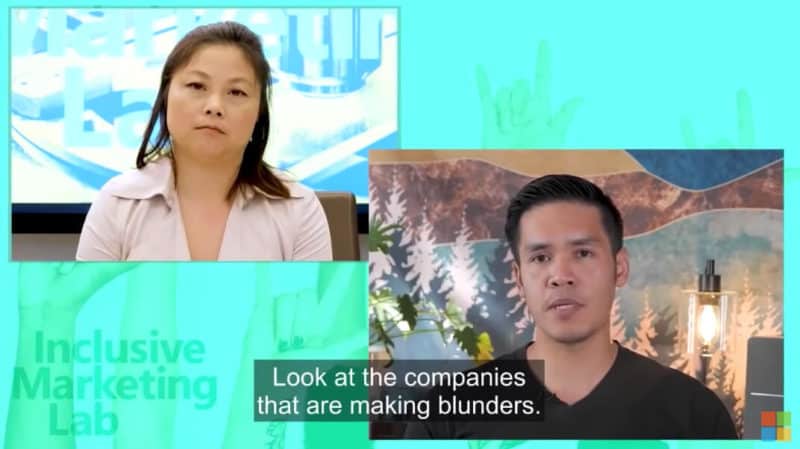
Knowing your audience and what they want has always been a cornerstone of marketing, but the standard for modern, successful campaigns has grown to include what your audience cares about as well.
Customers are no longer just voting for brands or products via their purchases. Now, they’re also voting for the future they would like to see the world move towards — a future in which climate change is being addressed, centuries of socioeconomic and racial injustices are being corrected and equality and inclusivity are available to all.
This means that brand values are now part of your unique selling point — and if you’re not promoting values that align with your audience, it’s likely that one of your competitors will. However, inclusive marketing isn’t just a tactic to pander to audiences. It’s here to underscore humanity and the common struggles we face while recognizing and celebrating our differences.
It can also help propel your brand towards its business goals: More than two-thirds (67%) of respondents to an Edelman study said they bought from a brand for the first time because they agreed with its position on a controversial topic, while 65% said they wouldn’t buy from a brand when it remains silent on issues they care about. And, inclusive ads drove a 23-point lift in purchase intent among consumers belonging to Gen Z, whether the person experiencing the ad was represented or not, according to Microsoft, meaning that inclusive marketing can help drive your sales funnel as well.
To help further your understanding and strengthen your messaging, we’ve compiled a list of resources that can serve as the foundations for your brand’s inclusive marketing efforts.
Evaluate your own biases
Relying on your own judgment when auditing your implicit biases means that you’re the judge and jury, which can lead to a self-defeating exercise. Instead, try resources like Harvard’s Implicit Association Test (IAT).

The IAT can help you identify your implicit biases across many categories, like gender and career, skin tone, religion, disability, sexuality, weight, age and more. Once you’ve taken the IAT, share it with your team so that everyone can keep a watchful eye over how their own biases may make their way into your marketing campaigns.
Inclusive marketing resources
Here are a number of resources for brands to consider as they build inclusivity and diversity into their organizations and campaigns.

There is also a growing tech space featuring solutions which promote diversity and inclusion. Two examples are Knockri, which seeks to to remove bias (and tokenism) from the recruitment process, and Keep Wol, which automates and gamifies diversity training.
Our sister site, Search Engine Land, presents an annual award for Advancing Diversity and Inclusion in Search Marketing to recognize the individuals and organizations that are driving positive change in the search community. The 2021 winners are Rejoice Ojaiku, for her work in founding B-Digital, “a digital marketing platform aimed at showcasing and inspiring Black talent,” and hasOptimization, a New Hampshire-based agency whose marketing efforts are complemented by their work for both inclusion and diversity across many areas of focus.
Read next: How putting inclusion first can lead to diversity.
Inclusive marketing guides
Google and Bing, the search platforms that are at the center of many of our campaigns, have recognized the value and need for inclusive marketing by publishing their own resources on the subject.
- Microsoft’s Marketing with Purpose Playbook: Available as a free download, the Marketing with Purpose Playbook is one of the most comprehensive resources for inclusive marketing statistics (which can help you secure executive buy-in) and tips. The 101-page PDF is divided into three important areas for marketing (responsibility, values and inclusion) and covers a wide range of audiences.
- Google’s All In Inclusive Marketing Insights: Created from the lessons Google learned as it began its own inclusive marketing practices, this resource center has strategies for building teams, making inclusive creative choices, embedding inclusion into your strategy as well as audience insights to help eliminate stereotypes in your creative.
Inclusive language guides
Creating a welcoming environment for diverse audiences starts with the language in our messaging. Below is a list of language guides from various organizations that can help you ensure inclusivity in your creative assets and content.
Accessibility
Accessibility for differently-abled individuals or those that rely on assistive technologies is often considered by marketers to be “someone else’s job,” but inclusive organizations recognize that the responsibility is shared by all. Here are some resources that can help you evaluate and improve your site’s accessibility, while potentially opening up new audiences for your brand and protecting you from ADA-related lawsuits.
Inclusive marketing for your campaigns
Numerous platforms have added ways for businesses to showcase their diversity. Below are some articles covering features that you can use to immediately add an element of inclusivity to your advertising or online presence.
This resource will be updated on an ongoing basis. If you have feedback, suggestions or resources to submit, please send an email to gnguyen@thirddoormedia.com.
This article first appeared on Search Engine Land.




